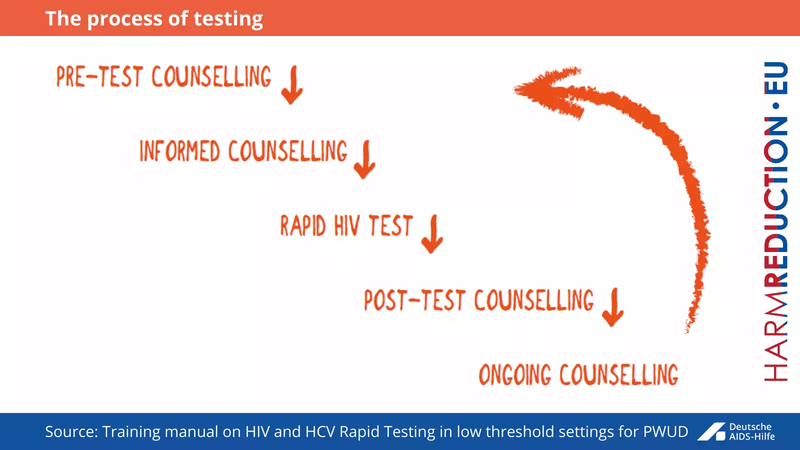Principles of pre- post-test counselling
HIV testing must always be done with informed consent, adequate pre-test information or counselling, post-test counselling, protection of confidentiality and referral to services.
According to WHO: “HIV testing must always be done with informed consent, adequate pre-test information or counselling, post-test counselling, protection of confidentiality and referral to services.” When testing PWUD, the counselor has the right to not test if the client is too impaired and is unable to make an informed consent.
Prior to conducting any tests, an individualized assessment of capacity should be made in each case. The purpose of this is to verify the following:
- Is the person able to understand and appreciate the nature and consequences of undergoing HCV/HIV tests?
- Is this person able to make an informed decision about whether to be tested?

Counselling is an essential component of testing.
These are some fundamental general considerations for counselling:
- In order to make an informed choice, the client needs to have clear, accurate and specific information.
- Counselling differs from education, although education can be an important part of it.
- It does not intend to solve the clients’ problems for him/her or provide advice on how to solve them.
- It enables the client to: better understand the problem/issues; deal with related emotions and fears; find and evaluate different alternatives and make choices.
- It is an interactive process which actively involves the client, encouraging him or her to ask questions, providing feedback and discussing different issues as opposed to giving a lecture or questioning.
- It is private and confidential.
- It is individualized, as every client is a unique human being and the counselling should reflect the particular needs of the individual. It is centered on the needs, desires and reality of the client.
- The environment for counselling must be appropriate.
The standards formulated in the VCT concept highlighted above are an indispensable prerequisite for offering testing. The counselling takes place in two sections: the consultation before and the consultation after the test (pre-test and post-test counseling). HIV and or HCV testing should be carried out in such a way that the person being tested learns about HIV and HCV and risk management.
The consultation before the test provides: information on the expiration of the test; the meaning of a test result; clarity on personal risks; and answers to questions. Central to pre-test counselling is a detailed risk assessment (partly supported by a questionnaire), which can establish a connection between a possible transmission risk and the test procedure in such a way that it is comprehensible to the client. The content of the counselling can vary depending on the setting and the needs of the client.


